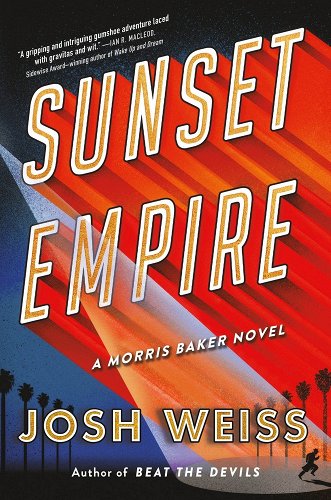Sequels are hard to pull off. Very hard, actually.
When CrimeReads asked me to put together another list of must-read alternate history thrillers, I felt the same brand of doubt and apprehension that had settled upon me as I sat down to write my second novel: Sunset Empire.
Would I be able to write another adventure with Detective Morris Baker? Could I match, or perhaps even top, last year’s collection of recommended thrillers?
The answer, in both cases, was the same: I wouldn’t know until I reached out in an effort to “touch the multiverse,” if you’ll allow me to borrow a phrase from Kang the Conquerer (for some reason, I feel compelled to quote the Marvel Cinematic Universe in these articles).
For this directory of Elseworld-esque excursions to worlds that might have been (fancy that, references to both Marvel and DC in the span of two paragraphs), I found myself drawn towards works of fiction centered around reimaginings of the Cold War and the nuclear game of Chicken that existed between the United States and Soviet Union in the latter half of the 20th century.
Given the fact that my own burgeoning series takes place against the backdrop of that precarious, post-World War II standoff, I’d say this was 100 percent intentional. But then again, I’m not that clever. Here’s hoping you enjoy my sequels…
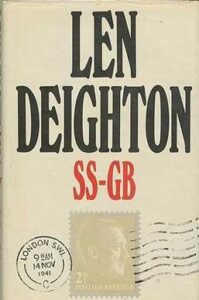
SS-GB, Len Deighton (1978)
In the introduction to the 2012 reprint of his novel, Deighton confesses that the prospect of writing a piece of alternate history fiction “was outside all my writing experience.”
Still, you’d never know it while reading SS-GB, a tightly-wound investigation through Nazi-occupied Britain that perfectly embodies the unparalleled spy thriller sensibilities of the man who created Harry Palmer.
Not wanting to make a hero out of a Nazi, Deighton decided to frame the narrative through the eyes of Douglas Archer, a detective for Scotland Yard (controlled here by the SS), who tragically lost his wife to the relentless German bombings preceding the United Kingdom’s surrender to Adolf Hitler. “A man who solved crimes and hunted only real criminals could have contacts at the top and yet still be acceptable as a central character,” the author explains.
The book — like so many that would be modeled after it in the decades that followed — represents a well-concocted stew of detective work, political maneuvering, royals in exile, determined resistance fighters, and, of course, a handful of atomic secrets.

The Divide, William Overgard (1980)
Coming in at a brisk 244 pages, The Divide is one of those light paperbacks you can easily knock out in a long summer afternoon. Just like The Man in the High Castle, the novel takes place in an alternate United States carved up between Nazi Germany to the East and Imperial Japan to the West. The post-war superpowers enjoy a tenuous peace maintained by the threat of total nuclear annihilation.
Tensions are expected to ease slightly once Hitler and Tojo meet for a detente summit held in the exact center of the U.S. known as “the Divide.” Both tyrants are traveling there by train — a cheap PR stunt meant to rouse American spirits by recalling Abraham Lincoln’s tour from Springfield to Washington. However, this slow and exposed mode of transport raises concerns of sabotage and assassination.
Overgard takes every opportunity to sprinkle in imaginative bits of world-building, some of which are absolutely stomach-turning. At one point, Hitler relives “the good old days” with an almost pornographic snuff film of American leaders (think General George Marshall) hung for war crimes at a meat packing plant outside Washington D.C.
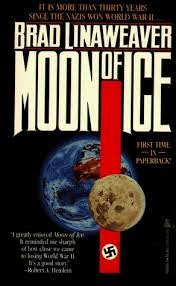
Moon of Ice, Brad Linaweaver (1988)
Moon of Ice is another one of those easily transportable paperbacks that smells like cheap glue and yellowing wood pulp (at least my copy does).
Nuclear stalemate is once again the name of the game with the United States locked in a game of thermonuclear wits with Nazi Germany, which became the “Greater Reich” after conquering Europe more than three decades before. A good chunk of the narrative takes the form of first person writings set down by Reich Minister of Propaganda Josef Goebbels, whose diary entries — “suppressed in Germany and all of its colonies” — are about to be released through an American publisher by his rebellious daughter, Hilda.
The book is at its best when Linaweaver presents cheeky reversals of cultural touchstones we all take for granted. My favorite excerpt details a Nazi-produced version of Raiders of the Lost Ark directed by an up-and-coming filmmaker by the name of “Stefan Schellenberg.” Instead of Indiana Jones, this reality has Professor von Moltke, a professor of archaeology at the University of Berlin and a swashbuckling action hero loyal to the Führer who thwarts evil British soldiers from getting their hands on the mystical “Aryan Stone.”
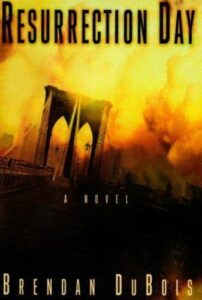
Resurrection Day, Brendan DuBois (1999)
Resurrection Day takes the Cold War specter of mutually assured destruction to its logical conclusion, chillingly painting a world so vivid, it feels less like a work of fiction and more like a historical text plucked from somewhere out in the multiverse.
Set 10 years after the United States and Soviet Union exchanged ICMBs, a weary world tries its best to pick up the pieces of nuclear devastation. The USSR has essentially been wiped off the map, while America barely clings to its own sovereignty, relying on foreign aid from Britain and Canada. The late President John Fitzgerald Kennedy enjoys an almost mythological postmortem status, but not the one he received in the wake of our universe’s Dallas assassination. Blamed for failing to stop the deaths of millions of innocent people, Kennedy (and anyone even closely associated with him) is considered a mass murderer in line with Hitler and Stalin.
But does JFK truly deserve such infamy? That’s what Carl Landry, a reporter for the Boston Globe and former advisor to U.S. forces in South Vietnam (the sudden atomic war put the kibosh on the whole Indochina quagmire before it could begin in earnest) must find out.
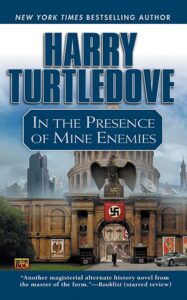
In the Presence of Mine Enemies, Harry Turtledove (2003)
It’s hard to discuss alternate history without mentioning Harry Turtledove, one of the most (if not the most) prolific writer of the genre. Not only is the author’s output impressive, but the work itself is astonishingly great every time. One might even go so far as to call Mr. Turtledove the Stephen King of multiversal storytelling.
I haven’t even made a tiny dent in his bibliography, but In the Presence of Mine Enemies is one of those reads I simply could not put down. As a practicing Jew — and, more importantly, a practicing Jew whose family was directly affected by the Holocaust — making my way through the novel felt like a constant panic attack.
In this universe, the United States remained neutral and the Axis powers conquered the world. Nearly half a century later, the self-proclaimed “Germanic Empire” flexes its supremacy on the global stage with manned missions to Mars, the radioactive remains of the Liberty Bell, and a society completely devoid of Jews…or so they think.
A number of Hebraic individuals actually survived the Final Solution and have been living (and procreating) in secret all these years — just like the Marranos of the Spanish Inquisition. If anyone in this civilization raised on a steady diet of hate were to find out the truth…
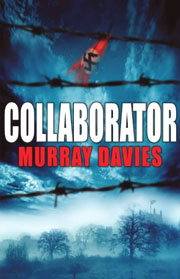
Collaborator, Murray Davies (2003)
“We are going to corrupt England and you will help…”
Shortly after he arrives home from a prisoner-of-war camp, Nicholas Fricourt Penny becomes a pawn in the crushing Nazi occupation of Great Britain. Nick’s fluency in German places him under the watchful eye of Kurt von Glass, a high-ranking military governor tasked with setting up the Anglo-German Friendship League. Described by Glass as “the Führer’s current pet idea,” the organization is, on its surface, meant to facilitate closer relations between the two nations. Its real purpose, however, is to “turn the British into National Socialists.” Nick proficiently acts the part of a good follower — all while getting entangled with the underground resistance movement dedicated to undermining the Nazis at every turn as the Third Reich prepares to install the Duke of Windsor and Wallis Simpson as puppet monarchs.
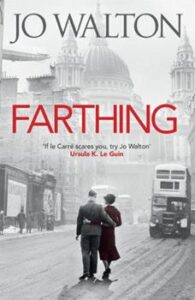
Farthing, Jo Walton (2006)
Farthing is a powerful anti-fascist parable masquerading as “a cozy detective story,” Walton remarked in a 2017 interview with Fantasy Faction. “The idea was, cozy murders are about violent death, but they’re not written like they’re about violent death. They all have crumpets and afternoon tea in the library. I thought I could use those same techniques to write about fascism.”
When a member of the “Farthing set” — a group of societal elites who brokered the truce with Hitler in 1941 — turns up murdered, Inspector Peter Anthony Carmichael of Scotland Yard (a veteran of Dunkirk and a closeted homosexual), is called to the scene of the crime.
Many would very much like to pin the homicide upon the shoulders of David Kahn (a Jew who married into the Farthing crowd in spite of the overwhelming disapproval) and call it a day, but that’s not exactly how Carmichael rolls. The intrepid Inspector would return in two more adventures: Ha’penny (2007) and Half a Crown (2008).

Amerika, Paul Lally (2015)
Some books leap off the page more than others. That’s the only way I can describe Amerika, the first in a trilogy of novels set in a universe where the United States was forced to roll over for the Nazis after New York and Washington D.C. disappeared under a pair of mushroom clouds.
Nearly all of the federal government is wiped out in an instant during FDR’s “Day of Infamy” address to Congress in December 1941. Secretary of Labor Frances Perkins, the only surviving member of the presidential cabinet, becomes the first female president of the United States and is forced to accept terms of neutrality set down by Hitler.
It’s an explosive (no pun intended) way to start a novel and things only get better as the story proper gets underway: Pan Am aviator turned lowly charter pilot Sam Carter finds himself drawn into a swashbuckling adventure by movie star Ava James and her agent, Nathan “Ziggy” Siegel. Their mission? Give America a fighting chance by depriving the Nazis of more weaponized uranium.
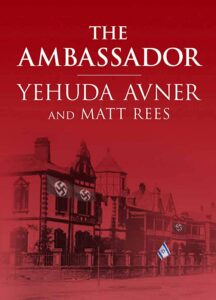
The Ambassador, Yehuda Avner & Matt Rees (2015)
The Ambassador is modeled in the vein of Michael Chabon’s The Yiddish Policemen’s Union, imagining a sovereign Jewish country born into existence before the Holocaust wiped out 6 million innocent souls. Successfully implementing the partition recommendations laid out by of the Peel Commission in the late 1930s, the British government approves the creation of an independent Jewish state in Palestine.
With the climate in Germany becoming worse by the day, Dan Lavi, an assistant to Prime Minister David Ben-Gurion, becomes Israel’s ambassador to Berlin. His first and only priority is to get as many Jews out of the country as possible before it’s too late. Like In the Presence of Mine Enemies, the book thrusts the most vulnerable protagonist imaginable into the lion’s den with nail-biting results.
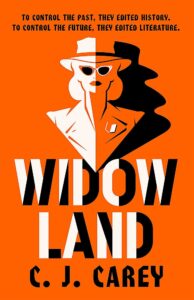
Widowland, C.J. Carey (2021)
In July 1935, a mere two years after Hitler was appointed chancellor of Germany, The New York Times ran the following headline: “Nazis Challenged on View of Women; German Feminist Condemns ‘Hausfrau’ Ideal and Child-Bearing Campaign.” Even then, people were calling out the Nazis for their archaic views on women, who were seen as nothing more than baby factories for the Third Reich. An unmarried woman of child-bearing age, went the twisted rationale, wasn’t fit to occupy a place in the National Socialist utopia.
C.J. Carey turns this concept on its head in Widowland, which takes place a little over a decade after the U.K. allied with Germany and became half of the “Anglo-Saxon Alliance,” where women are broken up into different social strata. “Gelis,” women who have produced four or more children are at the top, whilst “Friedas,” women over the age of 50 without children and “no reproductive purpose and who did not serve a man,” are at the very bottom.
The latter segment of population is forced to live a life of exile in a London slum known as “Widowland.” It’s also a hotbed of seditious activity, prompting Geli Rose Ransom to infiltrate the shunned community ahead of the highly-publicized coronation that will place Edward VIII and Wallis Simpson on the throne.
Speaking to The Nerd Daily last summer, Carey revealed how she was inspired to write the novel shortly after the passing of her husband:
“I was having lunch with an old friend who was commiserating. He said, ‘We’d love to invite you to dinner . . .’ yet before I could say yes, he added, ‘but we only have couples to dinner.’ As I was walking home, I thought, I’m living in widowland now. Almost immediately, the idea came, what if widowland was a real place, where women were shunted to the edges of society? And what if those women turned out to be the most subversive and literate people in the land? So my friend did me a favor without knowing it.”
***
